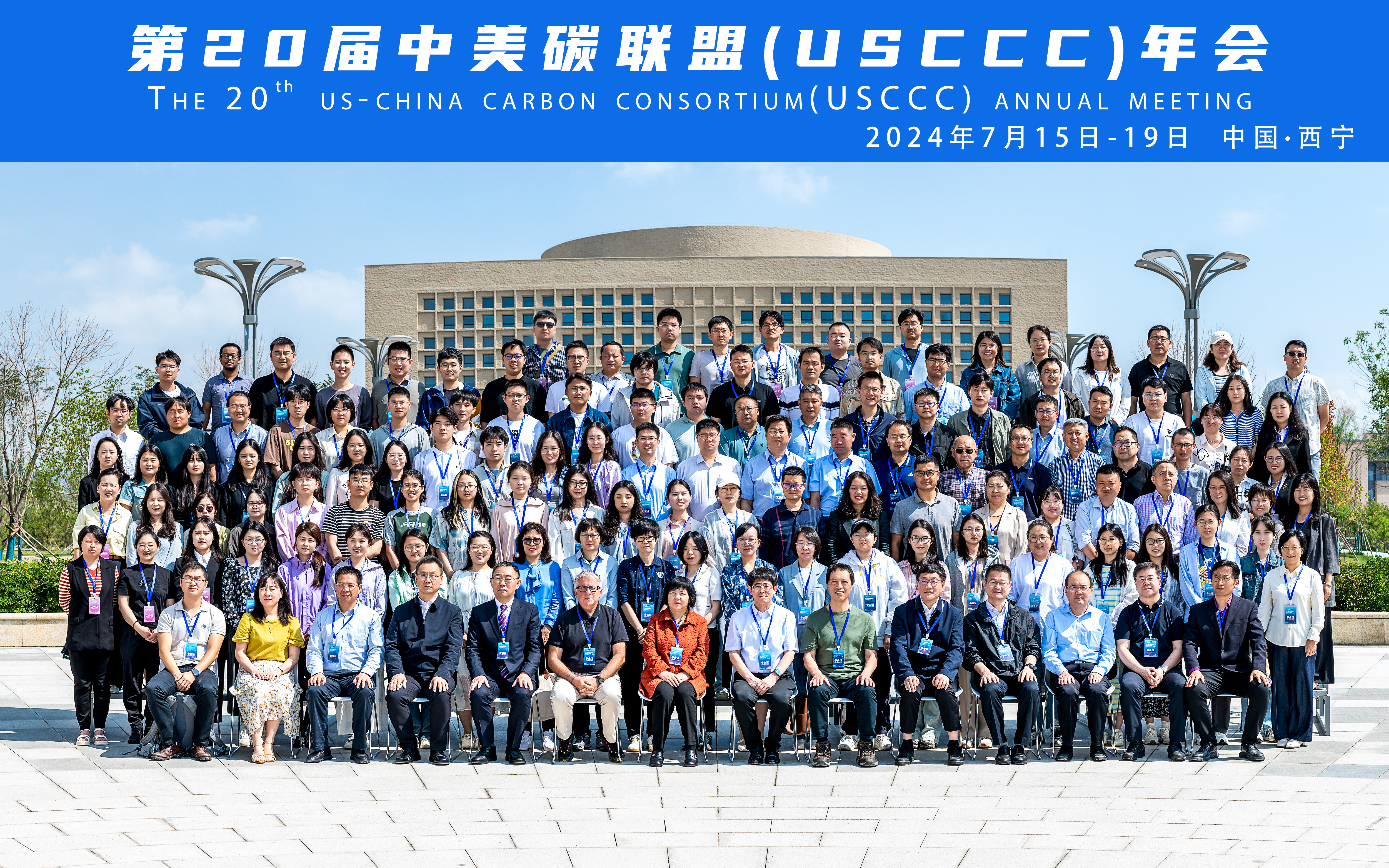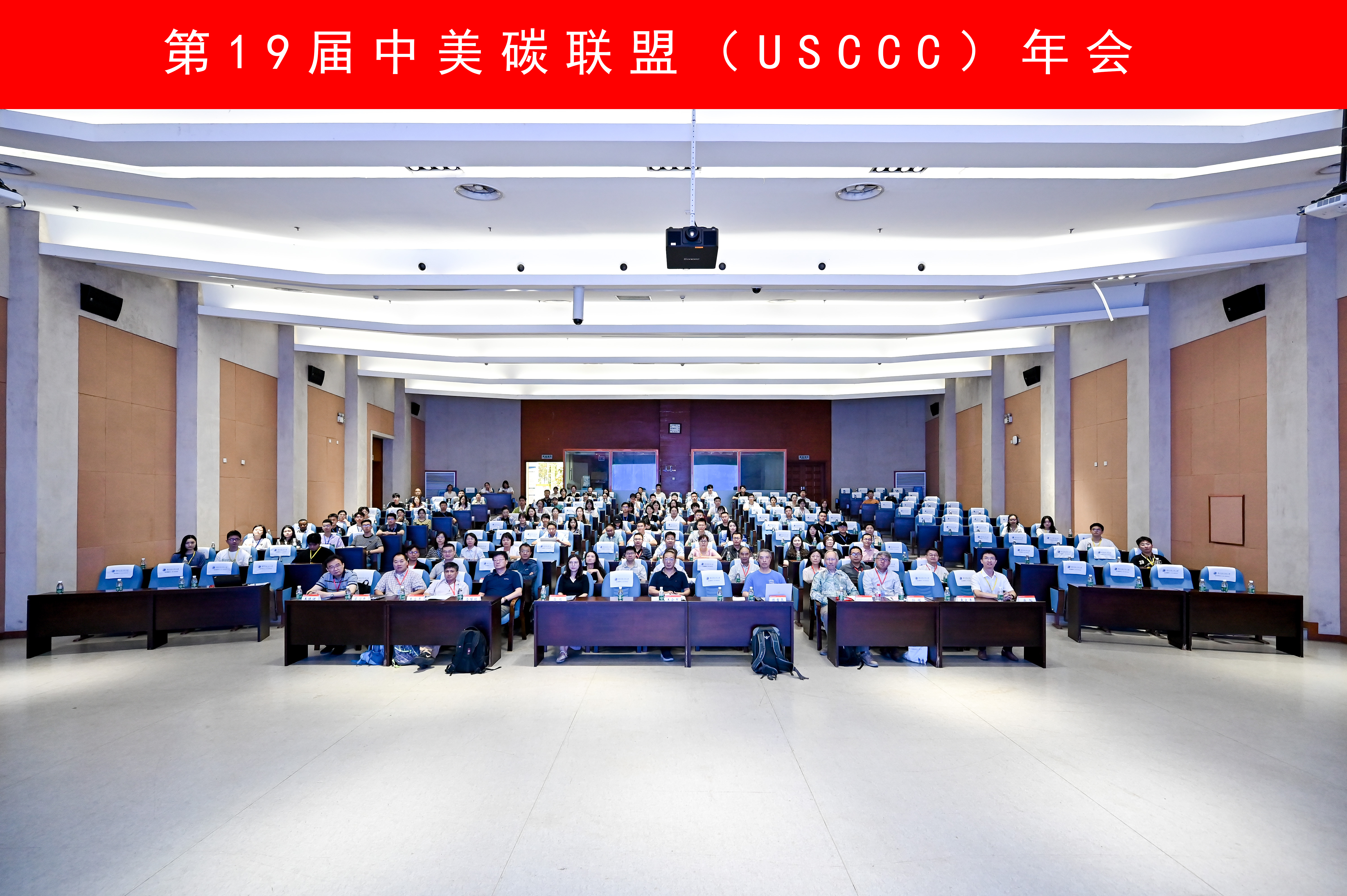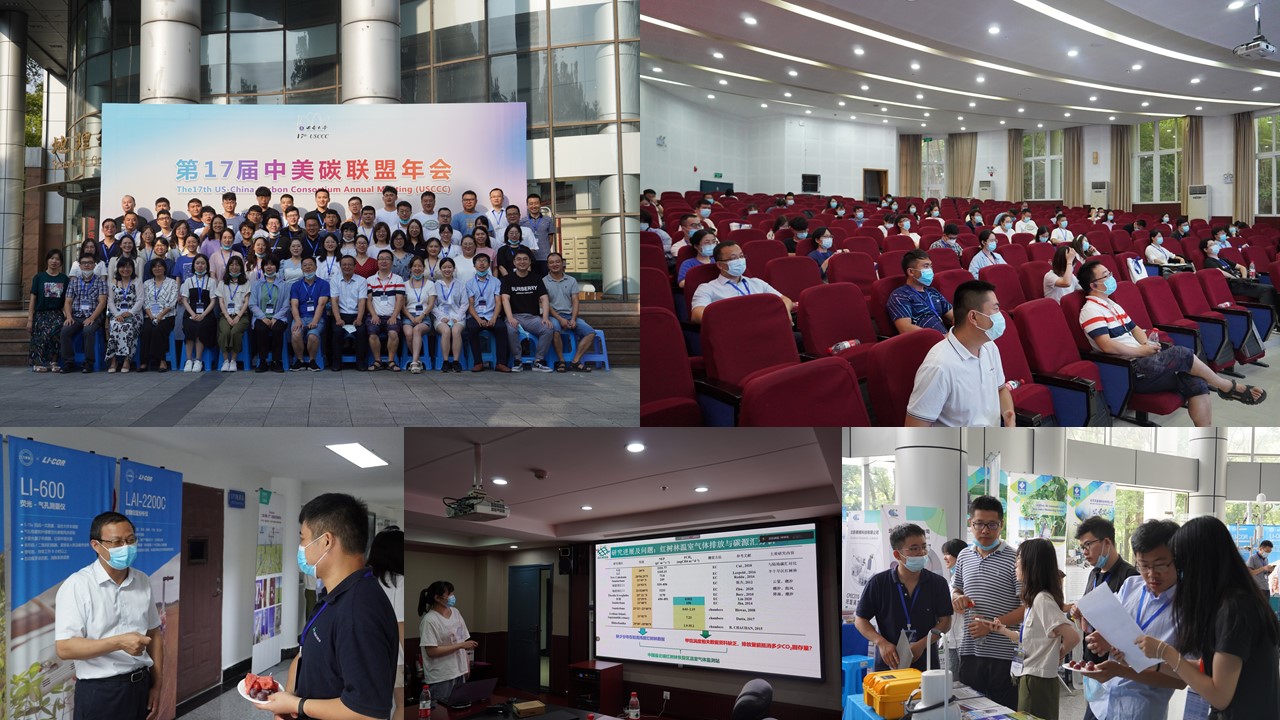US-China Carbon Consortium (USCCC)

20th Annual Meeting
The impact of rapid climate change and human activities on land carbon and water cycles
Xining, China | July 15 – 19, 2024
Organizers: School of Ecology and Environmental Science, Qinghai University of Science and Technology
Toics:
(1) Carbon cycle at large-scales
(2) Hydrology and climate
(3) CH4 and CO2 source-sink in terrestrial ecosystems
(4) Ecosystem change and its attribution to carbon budget





Presentations (alphabetical list by last name)
Chen, JQ. Foundation for Estimating Global Warming Potentials (GWP) from Altered Land Surface Albedo
Chen, Tiexi et al. Estimation of terrestrial gross primary production-current progresses and challenges
Du, LT et al. Carbon and water cycle coupling of anthropogenic shrub ecosystem in desert steppe and its response to drought
Huang, WL et al. 结合多源遥感和生态模型的森林生物量监测与预测
Liu, D et al. Changing vegetation growth on Tibetan Plateau and its impact on carbon uptake
Liu, YB et al. Causes for the increases in both ET and water yield over vegetated mainland China during the last two decades
Sun, Ge. Wha is, and what is NOT Shui Yuan Han Yang (SYHY) Services?
Yue, X et al. Large potential of strengthening the land carbon sink in China through anthropogenic interventions Zhang, J. Warming-induced hydrothermal anomaly over the Earth’s three Poles amplifies concurrent extremes in 2022
Zhang, L. An Integrated Rate Methodology (IRM) for Estimating Terrestrial Water and Carbon Fluxes
Zhang, Z. Wetland methane feedback over the last decades
Zhao, X. The Role of Herbivores in Grassland Carbon Budget on Tibetan Plateau
19th Annual Meeting
Land carbon and water cycles under the changes of climate and environment
Nanjing, China | July 25 – 29, 2023
Organizers: Nanjing University of Information Science and Technology (NUIST)
Toics:
(1) Multi-site and long-term measurements of ecosystem carbon and water fluxes
(2) Multi-source data fusion and new technologies for data analyses
(3) Modeling of ecosystem carbon and water cycles
(4) Multi-system interactions among climate, environment, and ecosystems

Overview||
Presentations
3. Weimin Ju: Delayed and accumulated responses of global GPP to drought
5. Tijian Wang: Development of the regional climate-chemistry-ecosystem coupled model
6. YingPing Wang: Coupling of energy, water and carbon cycle: a retrospective and prospective
11. Tiexi Chen: Estimating Global GPP Using a Machine Learning ApproachA
12. Xianglan Li: Methane Emissions offset Carbon Dioxide Uptake in Costal Blue Carbon Ecosystems
14. Yuanbo Liu: Catastrophic Shifts in Large Lake Levels
15. Bin Yuan: Flux measurements of air pollutants and greenhouse gases in urban areas
17. Jie Pei: Risk assessment of crop yield reduction by ozone pollution in U.S.
18. Jingping Tang: Digital assessment system for land carbon sink
21. Xinyi Dong: Simulation of CO2 in China based on WRF-VPRM
22. jiquan Chen: Scientific Writing
24. Jun Zhang: From Flow to Flux —chasing the wind
Special Issue for "Environmental Research Letters"
Nature-Based Solutions Toward SustainabilityGuest Editors:
Xu Yue, Nanjing University of Information Science and Technology, China; Ge Sun, USDA Forest Service, USA; Mariska te Beest, Utrecht University, Netherlands; Jun Zhang, Netherlands Organization for Applied Scientific Research, Netherlands; Maricar Aguilos, North Carolina State University, USA; Xianglan Li, Beijing Normal University, China; Jintai Lin, Peking University, China Scope: The nature-based solutions (NbS) aim to achieve co-benefits for human well being and ecosystems through effective actions, including practices and policies, in the management of natural and modified ecosystems. The application of NbS causes impacts on the carbon, water, and energy cycles among the Earth systems. In turn, the efficiency of NbS is influenced by environmental perturbations resulting from the dynamic interplay of climate change, societal factors, and technology advancements. To acquire a comprehensive understanding of the benefits and tradeoffs associated with NbS, emerging efforts are required for the integration of various methodologies, including direct measurements, remotely sensed information, Earth System Models (ESM), up-to date analyses such as meta-analyses, numerical simulations, artificial intelligence, and cross-disciplinary investigations. This special issue for Environmental Research Letters (ERL) provides an interdisciplinary outlet to advance the understanding of the effective roles of NbS by exploring feedback mechanisms within Earth systems. While not exhaustive, the proposed topics for this collection include: Responses of diverse ecosystems to the climate, environment, and societal changes. The role of NbS in enhancing land carbon sink strength and improving water quality and quantity, and other ecosystem services. State of art in integrating cross-site and long-term measurements and modeling of ecosystem fluxes. Advances in big data fusion, modeling, and integration technology through ESM and machine learnings. The economical and societal benefits of NbS in context of ecosystem functions and dynamics. Mechanistic understanding of coupling human and nature systems through the lens of climate, environment, and ecosystem interactions. Submission process Focus issue research articles must be of the same format and meet the same publication criteria as regular research Letters in ERL. They are also subject to the same rigorous review process, high editorial standards and quality/novelty requirements. Read the about the journal page for more information before submitting. For more comprehensive information on preparing your article for submission and the options for submitting your article, see our author guidelines. Please submit your article via our online submission form. You should submit the appropriate article type for your submission then choose 'Focus on Nature-based Solutions Toward Sustainability' from the drop-down menu. We encourage authors to include a cover letter, or separate justification statement (in the 'File Upload' step) outlining how your article meets the requirements of ERL, and why it is suitable for consideration in the journal, and focus issue (see the 'special requirements' section). Deadline for submissions: 31 March 2024 WebLink: https://iopscience.iop.org/collections/erl-230703-27918th Annual Meeting
Wuhan, China | July 22 – 25, 2022
Theme
(1) Processes and regulation mechanisms of carbon, nitrogen and water cycle under complex terrain conditions (2) Emerging techniques and methods for flux measurement and analysis (3) Observations and researches on carbon and energy fluxes in urban landscape (4) Observations and researches on carbon fluxes in lakes and wetlands (5)Carbon cycle and paleoclimate during geologic time
17th Annual Meeting
Flux Observations, Analyses, and Simulations in Complex Footprint Surfaces

CHongqing, China | July 9 – August 2, 2021
Organizers: Southwest University

Overview||
Presentations
1. Jingming Chen: New progress in the global carbon assimilation system
2. Jiquan Chen: Deep learning and flux predictions: a new frontier for USCCC
6. Jingfeng Xiao: Studying diurnal variations of ecosystem processes from space
7. Housen Chu: A footprint-aware approach for model-data benchmarking across AmeriFlux sites
9. Xufeng Wang: No trends in spring and autumn phenology during the global warming hiatus
10. Da Wei: Climate and human driven terrestrial carbon fluxes on the Tibetan Plateau
11. Xing Liu: Current situation and carbon storage estimation of mangroves in Zhejiang Province
12. Qun Du: Carbon balance dynamics of different ecosystems in Southwest China
14. Lisheng Song: Remote sensing estimation and validation study of soil evaporation and vegetation transpiration
16. Yinsheng Zhang: Progress in the study of surface evapotranspiration loss from Asian water towers
17. Wenping Yuan: Study on the effect of atmospheric water stress on vegetation growth
18. Ainong Li: Discussion on stereoscopic observation and verification of mountain remote sensing
22. Yingping Wang: Carbon-water coupling at regional to global scales
23. Guanghui Lin: Progress of flux observation in mangrove wetland ecosystem over the past decade in China
24. Xu Yue: Simulation study on the impact of afforestation on terrestrial carbon sink in China
25. Tiexi Chen: Potential impacts of extreme events on ecosystem carbon cycling in specific land management contexts
26. Lei Fan: Dynamics monitor global forest carbon stock based on SMOS-IC LVOD
28. Yanwei Wang: Carbon flux characteristics of typical degraded karst ecosystem during early stage of natural regeneration
29. Wei Zhao: Spatiotemporal seamless downscaling of passive microwave soil moisture remote sensing products
30. Ning Ma: Regional and global surface evapotranspiration product development and Spatiotemporal dynamics
31. Xingming Zheng: Estimation method of soil moisture by radar remote sensing with prior knowledge
35. Zhongxi Ge: Using remote sensing to identify the peak of the growing season at globally-distributed flux sites: a comparison of models, sensors, and biomes - Presentation Award!
36. Kunxin Wang: Study on evapotranspiration observation of Alpine wetland in central Tibetan Plateau
37. Xinyue Liu: Time-lag responses of vegetation to environmental factors vary with vegetation type and soil texture in a temperate grassland in North China - Presentation Award!
38. Dongxing Wu: Temperature sensitivity analysis of ecosystem respiration at high latitudes in the Northern Hemisphere
39. Chenguang Tian: Terrestrial productivity response in the context of global warming of 1.5°C/2°C
40. Xinhao Li: Trends and variability of soil respiration in urban plantation forests in Beijing
41. Hao Zhou: Study on the effect of scattered radiation on global terrestrial total primary productivity - Presentation Award!
42. Yangyang Fu: A satellite-based light energy utilization model to assess winter wheat yield in China
44. Ruikun Gou: Drought limits subtropical mangrove productivity in southern China - Presentation Award!
45. Yanan Chen: Quantifying the variability in water use efficiency from the canopy to ecosystem scale across main croplands
46. Huimin Zou: Model performance of ecosystem respiration in grassland on the Mongolian Plateau - Presentation Award!
48. Yao Xiao: Complex surface temperature reconstruction
49. Guoqing Yang: Analysis of the attribution and driving mechanism of the impact of water volume change in Qinghai Lake from 1975-2014 - Presentation Award!
50. Xiaoyun Wu: Synergistic regulatory mechanisms of extreme heat and soil water deficit on water use strategies in poplar plantation forests in northern China
51. Yuxi Luo: Effect of vegetation succession on soil organic carbon dynamics and stability in a karst trough valley
52. Yun Zhou: Spatialization of population based on multi-source data and random forest - Presentation Award!
53. Shan Fu: Satellite-based Light Energy Utilization Model to Assess Corn Yield in Illinois, USA
55. Rongkun Zhao: A review of remote sensing-based rice monitoring
57. Pengyuan Wang: Simulation of site carbonyl sulfur (COS) and CO2 fluxes based on an improved BEPS model
59. Qingsong Zhu: Impact of age-dependent albedo on global warming potential in temperate forests
60. Hao Jiang: Forest resilience monitoring in southwest China based on multi-source remote sensing and Bayesian dynamic linear model
61. Lujun Xu: The influence of lakes on regional energy and material exchange under complex topography
62. Yanwei Wang: Flux observation of Puding Karst Ecosystem Research Station: from plot to small watershed scale
63: Xiaonan Guo: Dynamics of nocturnal evapotranspiration and its biophysical controls over a desert shrubland in Northwest China
64. Haibo Wang: Carbon fluxes of alpine, oasis, and desert ecosystems in Heihe River Basin
65. Fengxhu Yang: Comparison of different SIF remote sensing products in the Chinese region
66. Yanpeng Yang: Research on Land Cover in the Qilian Mountains Based on GEE Cloud Platform and Machine Learning Algorithms
67. Xiaoni Meng: Evaluation of the Performance of Different Methods for Estimating Evaporation over a Highland Open Freshwater Lake in Mountainous Area - Poster Award!
68. Shanshan Song: The impact of land-use and land-cover change on mangrove greenhouse gas emissions: A global meta-analysis
Trainning Workshops
- Jiquan Chen, Applications of biophysical models in flux studies
- Yanjie Li, R programming fundamentals and model building based on machine learning
- Ziwei Xu, Flux data processing and analysis
- Peiyu Lai, GEE-based big data mining
- Lei Fan, Writing paper in English
16th Annual Meeting
Hulunbuir, Inner Mongolia, China | July 25–28, 2019
Dynamics and Mechanism of Ecosystem Sustainability under Global Change
Organizers: National Hulunber Grassland Ecosystem Observation and Research Station & Institute of Agricultural Resources and Regional Planning, Chinese Academy of Agricultural Sciences
Short video by Dr. Ge Sun
Presentations
- Chen, Jiquan, et al. Sustainability of the Socioeconomic Ecological Systems along the Silk Road
- De Boeck, Hans. Short term impacts and legacy effects of heat waves and drought in alpine grassland
- Gao, Yu. Effects of biomass, daily and monthly tides on lateral detritus carbon flux in an estuarine wetland: An extension of the outwelling Hypothesis
- Han, Xibo. Improve Forest Quality and Enhance Carbon Sink Function Contribution from greater khingan Mountains Forest in Inner Mongolia
- Hao, Lu, et al. The Impacts of Urbanization-associated Land Conversions on Ecohydrologicaland Meteorological Processes in the Lower Yangtze River Delta Region
- Li, Fadong. In stu observation of soil CO2 flux and its isotopic ratio from cropland in the North China Plain
- Li, Xianlan, et al. Monitoring and Analysis on Blue Carbon Fluxces in Coastal Mangrove Restoration Area in Southern Zhejiang
- Liang, Naishen. Important Response and Feedback of Asian Terrestrial Ecosystems Carbon Cycle to Global Warming
- Lin, Guanghui. Comparisons in Ecosystem CO2 Exchange of Mangrove Wetlands among Multiple Sites
- Liu, Yibo, et al. Discrepancies in satellite-derived LAI products and effects on simulated carbon and water fluxes
- Lkhagvaa, Dansranbavuu.Estimating the Return of Investment in Mongolian Agriculture Using the Sectoral Balance Method
- Pueppke, Steve et al. Land, water , energy, and food systems in the Ili Balkhash basin of Central Asia
- Qu, Luping, et al. Heat wave and mowing effects on grassland Ecosystem
- Sun, Ge. A Critical Process for Understanding Ecosystem Functions and Services
- Zha, Tianshan. Divergentlong‐termtrendsandinterannualvariationinecosystemresourceuseefficienciesofasouthernborealoldblackspruceforest1999–2017
- Zhang, Fangmin. Uncertainties in carbon simulation& disturbance effects on carbon sinks and sources
- Zhao, Xiaosong, et al. Carbon Dioxide Flux over a Large Ephemeral Lake in China.
- Zhou, Decheng, et al. Potential impacts of climate change on vegetation dynamics and ecosystem function in a mountain watershed on the Qinghai-Tibet Plateau
Trainning Workshops
- 北京华益瑞科技有限公司. 生态气象仪器的野外现场标定
- 北京华益瑞科技有限公司. 物候数据处理
- Liang, Naishen. Long term Measurement of Soil CO2 /CH4 Flux& Grassland NEE using Automated Chamber System
- Chen, Jiquan. Developing Testable Hypotheses with Compelling Conceptual Framework
- Chen, Jiquan. Scientific Writing and Manuscript Development
15th Annual Meeting
Jiujiang, Jiangxi, China | AUGUST 15–17, 2018
Water-Heat-Carbon Nexus Fluxes in Terrestrial Water Bodies
The S&N International Hotel, Jiujiang
Organizers:
Nanjing Institute of Geography and Limonology (NIGLAS)
Chinese Academy of Sciences
Co-organizers:
Water Resources Research Center for Large-Lake Basin
Hydrological Bureau of Jiangxi Province
Jiujiang Science and Technology, Jiangxi Province
Poyang Lake Laboratory for Wetland Ecosystem Research, CAS
Quick Links:
Writing Workshops
Meeting Photos (Download)
Student Directory
Meeting Agenda
Past Annual Meetings
- 2019 | 16th Annual Meeting, Hulunbuir, Chinese Academy of Agricultural Sciences (Dr. Changliang Shao)
- 2018 | 15th Annual Meeting, Jiujiang, Chinese Academy of Sciences (Dr. Yuanbo Liu)
- 2017 | 14th Annual Meeting, Shanxi University (Dr. Gang Dong)
- 2016 | 13th Annual Meeting, Beijing Forestry University (Dr. Zhiqiang Zhang)
- 2015 | 12th Annual Meeting, Fundan University (Dr. Bin Zhao)
- 2014 | 11th Annual Meeting, Gansu-Lanzhou, Cold and Arid Regions Environmental and Engineering Research Institute, Chinese Academy of Sciences (Dr. Xin Li and Dr. Mingguo Ma)
- 2013 | 10th Annual Meeting, Hainan-Sanya, Center for Earth System Science, Tsinghua University (Dr. Guanghui Lin)
- 2012 | 9th Annual Meeting, Changsha-Zhangjiajie, Chinese Academy of Forestry Sciences (Dr. Xudong Zhang)
- 2011 | 8th Annual Meeting, Xiamen University (Dr. Guanghui Lin)
- 2010 | 7th Annual Meeting, Huang Shang, Tsinghua University (Dr. Peng Gong)
- 2009 | 6th Annual Meeting, Beijing Forestry University (Dr. Zhiqiang Zhang)
- 2008 | 5th Annual Meeting, Institute of Botany (Dr. Guangsheng Zhou)
- 2007 | 4th Annual Meeting, Beijing Forestry University (Dr. Zhiqiang Zhang)
- 2006 | 3rd Annual Meeting, Chinese Academy of Forestry (Dr. Xudong Zhang)
- 2005 | 2nd Annual Meeting, Institute of Botany (Dr. Guanghui Lin)
- 2003 | 1st Meeting, Beijing Forestry University (Dr. Zhiqiang Zhang)






